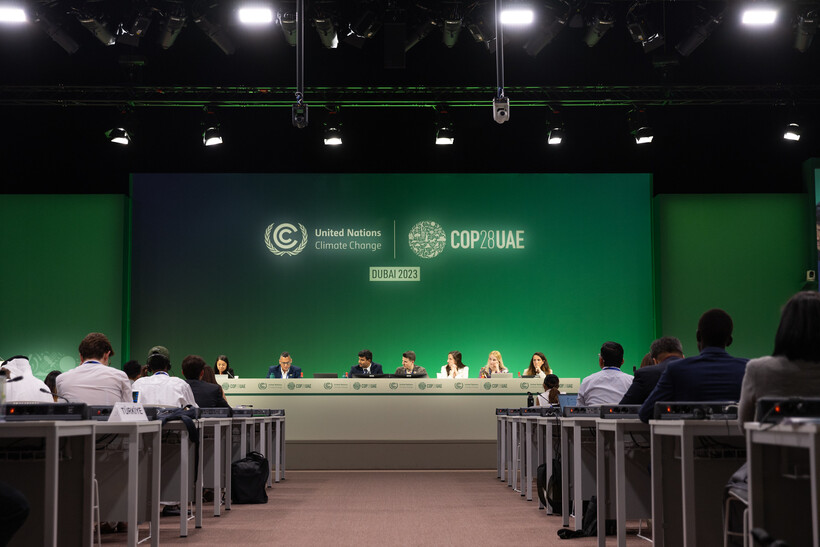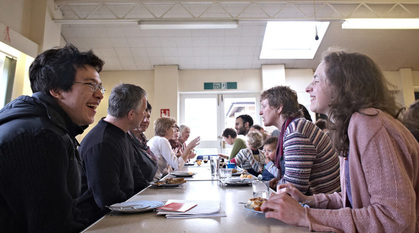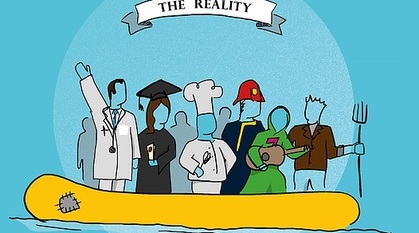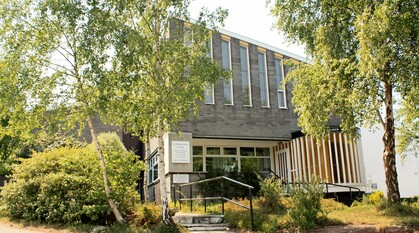Phasing out fossil fuels: the political dynamics of COP28
The UN climate talks, COP28, are currently being held in Dubai. Lindsey Fielder Cook from the Quaker United Nations Office reports back about how it's going.

Tens of thousands of people are flying in and out of the mega desert city Dubai to attend the 28th Conference of Parties (COP) on climate change. The setting is poignant; a once deeply poor, colonised land, now an oil rich country capable of quickly building a surreally unsustainable city.
With temperatures rising faster than expected, and ecosystems burning, the key question here is how a COP Presidency led by an oil executive will frame action on fossil fuels, the main driver of existential rates of global heating. Yet the challenges are intense, and efforts to protect, if not expand, fossil fuels have already been fought out in the approval sessions of the 6th Assessment Report Cycle (AR6) from the Intergovernmental Panel on Climate Change (IPCC). We would be wise to learn from these experiences.
The politics of fossil fuel dependence
The IPCC scientific reports are invaluable and feed accountability into international negotiations mostly dominated by money and power. The AR6 took some seven years to complete and involved 100s of scientists worldwide, most working voluntarily.
Yet IPCC reports are not immune from politics. Each massive report includes a short, readable Summary for policy makers which receives a line-by-line government adoption process. IPCC scientists have the right to refuse suggestions from government representatives that challenge the integrity of the science, yet in the exhausting marathon summary adoption sessions, sentences can be strengthened, weakened or – caught in the room's political sensitivities – dropped from the draft.
For example, at COP28, fossil fuel wealthy countries promote the words 'abated' and 'unabated' to not only normalise continued fossil fuel dependence, but also to justify increased extraction.
'Abatement' is to happen through carbon capture storage technology, a controversial technology to pump emissions into the ground. Yet this technology is not proven-to-scale, maintains fossil fuel dependence, is more expensive, less effective in reducing greenhouse gas (GHG) emissions, less equitable in ownership than renewable energy transformations, and leaves nightmare leakage costs to our children.
It was in the IPCC adoption processes that several governments first fought to categorise fossil fuels as 'abated' and 'unabated', and in turn to weaken IPCC scientific findings on the dangers of reliance on carbon capture storage.
Being a political compromise between several governments, the IPCC report offers no scientific definition of 'abated' in its glossary. The only language hinting of accountability measurement is, strikingly, left to a footnote: "'unabated fossil fuels' refers to fossil fuels produced and used without interventions that substantially reduce the amount of GHG emitted throughout the life cycle; for example, capturing 90% or more CO₂ from power plants, or 50–80% of fugitive methane emissions from energy supply".
At a time when urgent climate action is needed to avert catastrophic temperature rises, global rates of carbon capture storage deployment are, according to the IPCC, "far below those in modelled pathways limiting global warming to 1.5°C to 2°C". You do the maths.
The imbalance of 'net zero'
Woven into this denial fabric is the politically acceptable but dangerously misleading phrase of ' net zero'. The term did not exist in the last massive IPCC Report (which used 'near-zero'), nor in the Paris Agreement. 'Net zero' became a comfortable turn after Paris and the difference, and danger, lies in our comprehension of what really needs to happen.
'Net zero' implies an easy balance, feeding the notion that we don't need to deeply change, we just need to trade carbon 'credits', plant and protect trees, and pump emissions in the ground. Or it feeds engagement on scenarios of 'carbon dioxide removal' that would entail massive land use and risk water, food and biodiversity security. But 'net zero' is fashionable, despite the IPCC stating that 'net zero' CO₂ in energy systems entails "a substantial reduction in overall fossil fuel use".
Turning knowledge into action
As most climate scientists will tell you, the greatest challenge is not sufficient knowledge – this we have. The greatest challenge is a failure of political will. Amongst the most traumatic moments in an IPCC Summary Report adoption process, was witnessing a profound high confidence IPCC scientific finding – that urgent, feasible, and equitable near-term options are available at scale to address climate change and improve human well-being and planetary health – face political unpopularity and be dropped from a draft.
Denial and fear pervade these rooms. Fossil fuel wealthy developed countries are committed in the Paris Agreement to lead on mitigation and finance, but instead they lead on fossil fuel expansion. Our energy, economic and agriculture systems are driving existential rates of climate change. Globally, households with income in the top 10% contribute about 36–45% of global GHG emissions. The 10% are usually those in decision-making positions.
Addressing the lack of political will
Yet there are champions in the room. Colombia, a fossil fuel dependent economy, announced support for the Fossil Fuel Non-Proliferation Treaty. Costa Rica and Denmark, lead a total of 12 countries which have signed the 'Beyond Oil and Gas' initiative. And in these negotiations, New Zealand challenged countries with, "I have a question. Does anyone in the room believe that the science says or implies that the expansion of production and consumption of fossil fuels is in line with 1.5°C? Most of us around this table come from countries that are expanding licences for new oil, coal and gas, building new fossil fuel powers, and as individuals using more fossil fuels."
At the COP, we need more honesty and responsibility. It would go a long way to build trust so needed to overcome the hurt in the room.


